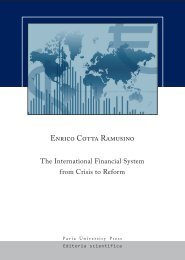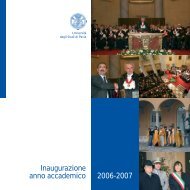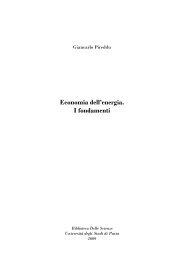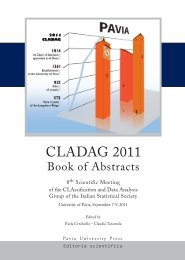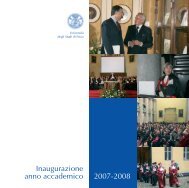The Palestinian Economy. Theoretical and Practical Challenges
The Palestinian Economy. Theoretical and Practical Challenges
The Palestinian Economy. Theoretical and Practical Challenges
Create successful ePaper yourself
Turn your PDF publications into a flip-book with our unique Google optimized e-Paper software.
310<br />
Di Martino – Sarsour<br />
literature that although operating in an area of conflict changes opportunity <strong>and</strong><br />
constraints, nonetheless issues of structural financial viability should not ab<strong>and</strong>oned. In<br />
other words, micro credit institutions can still be self-sufficient <strong>and</strong> financially viable<br />
even when embracing a wider set of objectives <strong>and</strong> operate in a particularly difficult<br />
environment.<br />
With these considerations in mind, Palestine thus appears to be a promising market<br />
for micro finance. This not only because of its potential size <strong>and</strong> opportunities for viable<br />
businesses, but also for the possible beneficial effects of micro credit in terms of stakeholding<br />
in a country whose economic development seems to suffer from passive<br />
overdependence on external aid. However micro finance institutors are still straggling to<br />
penetrate the full extent of the market, <strong>and</strong> they still show relatively disappointing<br />
performance in terms of managing aggregate risk. Clearly the two issues are linked<br />
together, but disentangling the cause from the effect is neither conceptually nor<br />
empirically easy. While some of the determinants of high risk are exogenous, for<br />
example, when it comes to invest in the Gaza strip rather than in the West Bank, others,<br />
however, depend on managerial choices. In particular embarking into deeper “market<br />
orientation” might be capable per se of reducing risk, although the literature is still<br />
divided on whether more extreme “commercialisation” of micro credit is the only or even<br />
the best way forward. 13 In the scenario of a being conflict area, this question applies to<br />
Palestine in a particularly urging way. Eventually selecting customers on the basis of<br />
market-based features <strong>and</strong> impact on risk comes at the cost of cutting-off the most<br />
vulnerable segment of the population, <strong>and</strong> this is a decision that cannot only emerge out<br />
of mere concerns for the health of balance-sheets, but must be motivated on ideological,<br />
moral <strong>and</strong> political ground too. On the other h<strong>and</strong>, maybe alternatives exist. For<br />
example, maybe pushing more energetically towards that direction <strong>and</strong> exploiting the<br />
combination of peer <strong>and</strong> religion-based pressure as enforcement mechanisms might<br />
allow to reduce aggregate risk without impacting too much on the moral component of<br />
micro credit mission.<br />
13 See, in particular, Campion (2002) <strong>and</strong> Olivares-Polanco (2005).





